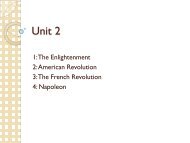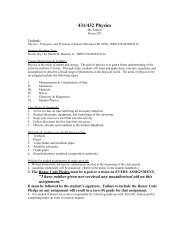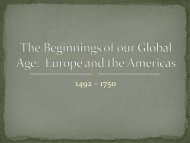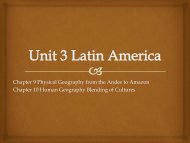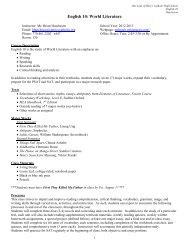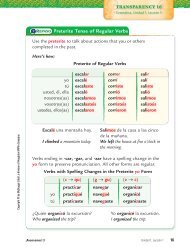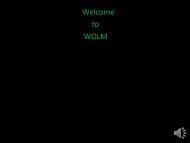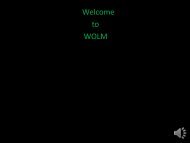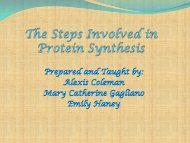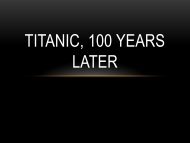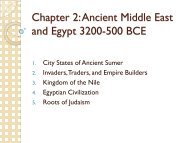The French Revolution and Napoleon:1789-1815
The French Revolution and Napoleon:1789-1815
The French Revolution and Napoleon:1789-1815
Create successful ePaper yourself
Turn your PDF publications into a flip-book with our unique Google optimized e-Paper software.
<strong>The</strong> <strong>French</strong><br />
<strong>Revolution</strong> <strong>and</strong><br />
<strong>Napoleon</strong>:<strong>1789</strong>-<strong>1815</strong><br />
1. On the Eve of <strong>Revolution</strong><br />
2. <strong>The</strong> <strong>French</strong> <strong>Revolution</strong><br />
3. Radical Days of the <strong>Revolution</strong><br />
4. Age of <strong>Napoleon</strong>
6.1 On the Eve of the <strong>Revolution</strong><br />
• Describe the Social divisions of France’s old<br />
order<br />
• List reasons for France’s economic troubles in<br />
<strong>1789</strong><br />
• Explain why Louis XVI called the Estates-General<br />
<strong>and</strong> summarize what resulted<br />
• Underst<strong>and</strong> why Parisians stormed the Bastille
Terms, People, <strong>and</strong> Places<br />
• Ancien Regime<br />
• Estate<br />
• Bourgeoisie<br />
• Deficit spending<br />
• Louis XVI<br />
• Jacques Necker<br />
• Estates-General<br />
• Cahier<br />
• Tennis Court Oath<br />
• Bastille
<strong>French</strong> Society Divided<br />
• Before the revolution, France is ruled under an<br />
ancien regime, or old order in which the country<br />
is divided into three classes<br />
• <strong>The</strong> three classes are called the Estate<br />
• <strong>The</strong> First estate is the Clergy<br />
• <strong>The</strong> Second Estate is the Nobility<br />
• <strong>The</strong> Third Estate is the Peasant Class
<strong>The</strong> Clergy Enjoy Wealth<br />
• Clergy of France still enjoyed great wealth<br />
• Clergy still provided social services<br />
• Schools<br />
• Hospitals<br />
• Orphanages<br />
• Philosophes targeted the Clergy for reform criticizing<br />
the church for involvement in politics
Nobles Hold Top Government Jobs<br />
Second Estate<br />
• Second Estate was the<br />
titled nobility<br />
• Under strict royal control<br />
the Nobles were granted<br />
top jobs in government,<br />
the army <strong>and</strong> courts<br />
• Nobles hated<br />
Absolutism, resented the<br />
Royal Bureaucracy that<br />
took their Jobs<br />
Third Estate<br />
• Vastly Diverse<br />
• Bourgeoisie-middle class<br />
lawyers, bankers,<br />
doctors, journalist,<br />
merchants<br />
• Bottom was the rural<br />
peasant class<br />
• Also included urban<br />
workers
Life of Privilege<br />
• <strong>The</strong> top two classes paid<br />
almost no taxes<br />
• Majority of taxation<br />
came from the Third<br />
Estate<br />
• Peasants angered when<br />
Nobles tried to re instate<br />
the manorial dues<br />
• Enlightenment ideas<br />
began to take hold in the<br />
Third Estate calling for<br />
the First <strong>and</strong> Second to<br />
pay their fair share
Checkpoint<br />
• What was the social structures of the old regime in<br />
France<br />
1. First estate: Clergy<br />
2. Second Estate: Nobles<br />
3. Third Estate: <strong>The</strong> majority of the population
Financial Troubles<br />
• France finical troubles came from Deficit Spending<br />
• Deficit Spending – government spends more money that it<br />
takes in<br />
• King Louis XIV lost Seven Years’ War<br />
• Louis XV spent on an extravagant lifestyle<br />
• Louis XVI (dull witted) lost money on the American <strong>Revolution</strong><br />
• Louis choose Jacques Necker as his finance minister<br />
• Necker was removed from his job when he imposed taxing the<br />
First <strong>and</strong> Second Estate
Checkpoint<br />
• What economic troubles did France face in <strong>1789</strong><br />
<strong>and</strong> how did they lead to further unrest<br />
• France had a large national debt <strong>and</strong> soaring<br />
food prices. This caused people to go hungry<br />
<strong>and</strong> then caused unrest among the people
Louis Calls <strong>The</strong> Estate General<br />
• With Pressure from the Wealthy <strong>and</strong> powerful<br />
upper class Louis calls the Estate General<br />
• Estate General – legislative body that<br />
encompasses representatives from all three<br />
classes<br />
• Called to meet at Versailles<br />
• Cahiers – notebooks filled with grievances to be<br />
presented before the Estate General
Delegates take the Tennis Court Oath<br />
• Estates General met May <strong>1789</strong><br />
• First <strong>and</strong> Second Estate would<br />
always vote together<br />
• Third Estate felt this was unfair<br />
since they represented the<br />
majority wanted a “Head Count”<br />
• After being left out of the votes<br />
the Third Estate convened on the<br />
tennis court next to the palace<br />
<strong>and</strong> voted themselves to be the<br />
National Assembly<br />
• Tennis Court Oath: declaring they<br />
would not leave until there was a<br />
sound <strong>and</strong> just constitution
Checkpoint<br />
• What actions did delegates of the Third Estate take when the<br />
Estate General met in <strong>1789</strong><br />
• <strong>The</strong>y declared themselves the National Assembly representing<br />
the people of France <strong>and</strong> took the Tennis Court Oath,<br />
swearing to meet until they created a new constitution.
Parisians Storm the Bastille<br />
• July <strong>1789</strong> Violence<br />
breaks out in the streets<br />
of Paris<br />
• Looking of weapons <strong>and</strong><br />
gunpowder the people<br />
head to the Bastille<br />
• Bastille – a medieval<br />
prison for political<br />
prisoners<br />
• <strong>The</strong> captain of the<br />
Bastille denies entry<br />
• Parisians storm the<br />
Bastille <strong>and</strong> chop off his<br />
head
Checkpoint<br />
• What was the significance of the storming of the Bastille<br />
• This was a new sense of empowerment of the people.
Section Review 6.1<br />
2. What led to the storming of the Bastille <strong>and</strong> the beginning of<br />
the revolution<br />
Inequalities between the Third Estate <strong>and</strong> the other two estates.<br />
Hunger <strong>and</strong> poverty, increasing cost. This led to the Third Estate<br />
to attack the nobles <strong>and</strong> dem<strong>and</strong> a new constitution. In this<br />
tense atmosphere, fear that the royal troops would occupy Paris<br />
led Parisians to storm the Bastille in search of weapons.
Section Review 6.1<br />
3. How did the views of Society differ between the nobles <strong>and</strong><br />
peasants in <strong>1789</strong> France<br />
Inequalities between the Second <strong>and</strong> Third estate.
Section Review 6.1<br />
• How would your economic reform program benefit France
Section Review 6.1<br />
5. What issues arose when Louis XVI called the Estates-General<br />
in <strong>1789</strong><br />
Issues about voting, which led the Third Estate to proclaim itself<br />
the National Assembly <strong>and</strong> take the Tennis Court Oath
6.2 <strong>The</strong> <strong>Revolution</strong> Unfolds<br />
• Explain how the political crisis of <strong>1789</strong> led to popular revolts<br />
• Summarize the moderate reforms enacted by the National<br />
Assembly in August of <strong>1789</strong><br />
• Identify additional actions taken by the National Assembly as<br />
it pressed onward<br />
• Analyze why there was a mixed reactions around Europe to<br />
the events unfolding in France
Terms, People <strong>and</strong> Places<br />
• Faction<br />
• Marquis de Lafayette<br />
• Olympe de Gouges<br />
• Marie Antoinette<br />
• Émigré<br />
• Sans-culotte<br />
• Republic<br />
• Jacobin
<strong>The</strong> <strong>French</strong> <strong>Revolution</strong> Unfolds<br />
Historians divide the <strong>French</strong> <strong>Revolution</strong> into phases<br />
• <strong>The</strong> moderate phase (<strong>1789</strong>-1791) <strong>The</strong> national assembly<br />
turned France into a constitutional monarchy<br />
• <strong>The</strong> radicle phase (1791-1794) period of escalating violence<br />
which led to the end of the monarchy <strong>and</strong> the Reign of Terror<br />
• <strong>The</strong> Directory (1795-1799) a movement away from the radicle<br />
ideas if the revolution<br />
• <strong>The</strong> Age of <strong>Napoleon</strong> ( 1799-<strong>1815</strong>)
Political Crisis Leads to Revolt<br />
• Rumors run wild of soldiers attacking towns <strong>and</strong><br />
stealing grains<br />
• This leads to a “Great Fear”<br />
• Peasants motivated by famine <strong>and</strong> fear attack<br />
nobles<br />
• Peasants destroy manorial records <strong>and</strong> steal<br />
grain
Paris Commune Comes to Power<br />
• Paris is in turmoil <strong>and</strong><br />
• <strong>Revolution</strong>aries are<br />
splitting into factions<br />
• Factions – dissenting<br />
groups of people<br />
struggling to gain<br />
power<br />
• Marquis de Lafayette -<br />
fought along side of<br />
George Washington<br />
was in charge of the<br />
<strong>French</strong> National Guard
Two Main Factions<br />
Moderates<br />
• Largely Middle Class<br />
• Organized the National<br />
Guard against the Royal<br />
troops<br />
• First Wore the Blue<br />
White <strong>and</strong> Red<br />
Radicles<br />
• Replaced the Royal<br />
Government in the City<br />
• Could mobilize whole<br />
neighborhoods to<br />
violence<br />
• Had newspapers <strong>and</strong><br />
political clubs
Checkpoint<br />
• What caused the <strong>French</strong> Peasants to revolt against the<br />
Nobles<br />
• Famine <strong>and</strong> Fear of Government assault. Rumors that soldiers<br />
were attacking villages <strong>and</strong> stealing grain
<strong>The</strong> National Assembly Acts<br />
August 4 in response to the violence the National Assembly<br />
meets <strong>and</strong> Feudalism is abolished. Nobel's in the Assembly<br />
agree to give up their privileges.<br />
This included-<br />
• Hunting rights<br />
• Manorial dues<br />
• Special legal status <strong>and</strong> titles<br />
• Tax exemption<br />
Nobles had lost all this already just made official
Declaration of the Rights of Man<br />
<strong>and</strong> the Citizen<br />
• Modeled after of the Declaration of Independence<br />
• All men were “born <strong>and</strong> remain free <strong>and</strong> equal in rights”<br />
• <strong>The</strong>y enjoyed natural rights to “liberty, property, security, <strong>and</strong><br />
resistance to oppression.”<br />
• Insisted governments existed to protect man not control him<br />
• All male citizens equal in <strong>French</strong> law<br />
• Asserted Freedom of Religion<br />
• Called for people to pay taxes with accordance of their ability<br />
• Set up equality for public office
Women were left out<br />
• Declaration of Rights of Man captured in the phrase “Liberty,<br />
Equality, Fraternity”<br />
• Declaration did not grant women equal rights<br />
• Olympe de Gouges – dem<strong>and</strong>ed equal rights for women<br />
• Wrote Declaration of the Rights of Women <strong>and</strong> the Female<br />
citizen<br />
• Argued all men <strong>and</strong> women were created equal <strong>and</strong> women<br />
had the same right to hold public office as men
Women March on Versailles<br />
• Marie Antoinette –<br />
Austrian born queen of<br />
France lived in great<br />
extravagance<br />
• Women angered by no<br />
food marched 13 miles in<br />
the rain to Versailles<br />
shouting for bread<br />
• Women refused to leave<br />
unless they met with the<br />
king<br />
• After storming the castle<br />
King Louis agrees to<br />
move to Paris
Checkpoint<br />
• How did the National assembly react to peasant uprisings<br />
• Voted to give up privileges like manorial rights, <strong>and</strong> tax<br />
exemption <strong>and</strong> titles.
National Assembly Presses On<br />
• Church is placed under state control<br />
• Priest <strong>and</strong> bishops were now elected<br />
• Church of France had no ties to Pope<br />
• Sold Church l<strong>and</strong> to raise money<br />
• <strong>The</strong> Constitution of 1791 establishes a new government<br />
• Set up a limited monarchy<br />
• Legislative assembly had power to collect taxes create laws<br />
• Members were elected by tax paying males 25 or older
Louis Tries to Escape<br />
• King is basically a<br />
prisoner<br />
• Decided to try to escape<br />
• Disguised as a servant<br />
rode out of Paris in a<br />
carriage<br />
• Someone recognized the<br />
king because his face<br />
was on money<br />
• Many declared Louis a<br />
trader to France because<br />
of his escape attempt
Checkpoint<br />
• What were the provisions of the Constitution of 1791<br />
• Set up a limited Monarchy, Created a new legislative assembly,<br />
replaced old provinces with 83 departments, abolished<br />
provincial courts <strong>and</strong> reformed laws
Radicles Take Over<br />
• rulers of European countries thought of it as a threat.<br />
• Increased border patrols to stop the “<strong>French</strong> Plague”<br />
• Émigrés - political refugees that flees France<br />
• Enlightened Despots turn against France<br />
• Catherine the Great burns her letters from Voltaire<br />
• Edmond Burke writer that was for the American revolution<br />
wrote<br />
“When ancient opinions <strong>and</strong> rules of life are taken away we have<br />
no compass to govern us.”
Threats come from Abroad<br />
• King of Prussian <strong>and</strong><br />
Emperor of Austria issue<br />
the Declaration of Pilnatz<br />
• Declaration stated that<br />
France would be attacked if<br />
they harmed the monarchs<br />
• People prepared for war<br />
• Working class Sans Culottes<br />
push the revolutions into<br />
the radical phase<br />
• San Culottes – working<br />
class <strong>French</strong> known for<br />
long pants
National Assembly declares War on Tyranny<br />
• San Culottes dem<strong>and</strong> republic<br />
• Draft a second Constitution<br />
• Republic – government ruled by the people<br />
• Jacobins begin to take power<br />
• Jacobin – salon made up of mostly middle class lawyers <strong>and</strong><br />
intellectuals<br />
• Declare war on Austria <strong>and</strong> Prussia <strong>and</strong> Britain<br />
• <strong>The</strong> powers expected to win easily but fighting went on from<br />
1792-<strong>1815</strong>
Checkpoint<br />
• How did the rest of Europe react to the <strong>French</strong> <strong>Revolution</strong><br />
• Supporters were pleased but the nobles <strong>and</strong> governments<br />
were against the revolution because of the violence.
6.2 Section Review<br />
2. What Political <strong>and</strong> Social reforms did the national assembly<br />
institute in the first stage of the revolution<br />
• Revoked privileges of nobles<br />
• Issued Declaration of Rights of Man<br />
• Placed church under state control<br />
• Wrote a constitution that set up a limited monarchy
6.2 Section Review<br />
3. How was the Declaration of Rights of Man <strong>and</strong> the Citizen<br />
similar to the Declaration of Independence<br />
Both documents emphasized freedom, equality, <strong>and</strong> natural<br />
rights for men.<br />
<strong>The</strong> basic principles came from the ideas of John Locke
6.2 Section Review<br />
4. What did the constitution of 1791 do How did it reflect<br />
enlightenment ideas<br />
Put Catholic Church under the control of the state<br />
Created a Legislative Assembly whose members would be<br />
elected by tax paying male citizens over 25<br />
Reflected Enlightenment ideas<br />
Ensured equality for male citizens
6.2 Section Review<br />
• Describe what happened to the monarchy.<br />
• <strong>The</strong> monarchy lost most of its power <strong>and</strong> was dethroned.
6.3 Terms, People, <strong>and</strong> Places<br />
• Suffrage<br />
• Robespierre<br />
• Reign of Terror<br />
• guillotine<br />
• <strong>Napoleon</strong><br />
• Nationalism<br />
• Marseilles
<strong>The</strong> Monarchy is Abolished<br />
• War is going poorly for<br />
the <strong>French</strong><br />
• Well Trained Prussian<br />
armies are slicing<br />
through France<br />
• Many officers are<br />
deserting because of<br />
loyalty to the king<br />
• Violence is breaking out<br />
because of disapproval<br />
of the King <strong>and</strong> the war<br />
• <strong>The</strong> Guillotine is<br />
introduced
<strong>The</strong> Guillotine<br />
• A new execution<br />
device invented by<br />
Dr. Guillotin<br />
• Thought to be a<br />
more humane form<br />
of execution<br />
• Became a symbol of<br />
terror in France<br />
• First to be guillotined<br />
were the kings<br />
guards at the palace
Tensions lead to Violence<br />
• August 10 1792 Parisians storm the royal palace<br />
of the Tuileries<br />
• <strong>The</strong>y carry the royal guards off to the guillotine<br />
• <strong>The</strong> Royal Family is forced to flee to the National<br />
Assembly for protection where they are taken<br />
into custody<br />
• Later In response to the Declaration of Pinatz<br />
mobs storm prisons holding nobles <strong>and</strong> priests<br />
killing about 1,200
Radicals Take Control<br />
• Backed by angry crowds the Radicals take<br />
control of the Assembly <strong>and</strong> rename it<br />
National Convention<br />
• Declare France a Republic<br />
• Call for equal Suffrage among ALL men<br />
• Suffrage – right to vote<br />
• Jacobins seize control
Death of a King<br />
• <strong>The</strong> Convention put<br />
Louis XVI on trial <strong>and</strong><br />
convicted of treason<br />
• January 1793 Louis is<br />
led to the gallows<br />
<strong>and</strong> executed by<br />
Guillotine<br />
• October 1793 Marie<br />
Antoinette is also<br />
executed
Checkpoint<br />
• What occurred after the radicles took control of the<br />
Assembly<br />
• Called for a new legislative body, extended right to vote to all<br />
male citizens, abolished the monarchy, established the<br />
republic, <strong>and</strong> executed the king <strong>and</strong> queen
Terror <strong>and</strong> Danger Grip France<br />
• After the death of the king France goes through<br />
a very dangerous time<br />
• <strong>The</strong>y are at war with Britain, Spain, the<br />
Netherl<strong>and</strong>s <strong>and</strong> Prussia<br />
• France is also facing internal rebellion from<br />
loyalist<br />
• Food shortages <strong>and</strong> famine still grip the city<br />
• <strong>The</strong> Convention is split between the Jacobin<br />
radicals <strong>and</strong> the moderate Girongins
<strong>The</strong> Convention creates a New Committee<br />
• <strong>The</strong> Committee of Public Safety is created to deal<br />
with threats to the revolution<br />
• 12 Person committee with Absolute Power<br />
• Prepared France for war by issuing a levee en<br />
masse<br />
• <strong>The</strong> carried out all trials <strong>and</strong> executions
Robespierre “<strong>The</strong> Incorruptible”<br />
• Maximilien Robespierre a<br />
radical <strong>and</strong> member of the<br />
Jacobin’s<br />
• One of the leaders of the<br />
revolution, a lawyer by trade<br />
• Called “the incorruptible”<br />
because of his fierce<br />
dedication to the peoples<br />
cause in the revolution<br />
• Was against the death penalty<br />
but evolved into a tyrant<br />
• Believed France could only<br />
achieve a “republic of virtue”<br />
through the use of terror<br />
• One of the Architects of the<br />
Reign of Terror<br />
“Liberty can not be secured<br />
unless criminals loose their<br />
heads”
Reign of Terror<br />
• September 1793 -<br />
July 1794<br />
• About 300,000 were<br />
arrested during the<br />
Reign of Terror<br />
• About 70,000 were<br />
executed
End of <strong>The</strong> Reign of Terror<br />
• Members of the Convention feared the Committee of Public<br />
Safety<br />
• Fearing that they were next to be arrested opponents to<br />
Robespierre arrested him<br />
• While in custody Robespierre tries to take his life He is sent to<br />
the guillotine<br />
• After his death the executions slowed drastically
Checkpoint<br />
• Why did Robespierre think the Terror was necessary to<br />
achieve the goals of the revolution<br />
• Believed it was necessary to go to extremes to continue the<br />
revolution
<strong>The</strong> <strong>Revolution</strong> enters the Third Stage<br />
• Moderates are now in charge of the Convention<br />
• Draft a third constitution<br />
• 1795 set up a five man Directory with a two<br />
house legislative system<br />
• Middle class <strong>and</strong> Bourgeoisie were the dominate<br />
force during this time period<br />
• Peace made with Spain <strong>and</strong> Prussia
Threats to the Directory<br />
• Directory filled with corruption<br />
• Rising bread prices caused revolt<br />
among the Sans- Culottes<br />
• Returning émigrés with loyal ties to<br />
the monarchy<br />
• Re emergence of the Catholic Church
Checkpoint<br />
• What changes occurred after the Reign of Terror came to an<br />
end<br />
• Moderates set up the Constitution of 1795 which set up a five<br />
man Directory <strong>and</strong> two house legislatures
<strong>Revolution</strong> Brings Change<br />
Nationalism<br />
• Fueled by revolutionary<br />
ideas nationalism<br />
spreads throughout<br />
France<br />
• Nationalism – strong<br />
feeling of pride <strong>and</strong><br />
devout loyalty to ones<br />
country<br />
Social Reform<br />
• Religious toleration<br />
• Set up schools<br />
• Organized systems to<br />
help poor <strong>and</strong> old<br />
soldiers<br />
• Abolished slavery in<br />
colonies
Checkpoint<br />
• What changes occurred in France because of the <strong>French</strong><br />
<strong>Revolution</strong><br />
• Monarchy is overthrown, old regime in gone, the state<br />
controls the church
6.3 Section Review<br />
2. What events occurred during the radicle events of the <strong>French</strong><br />
<strong>Revolution</strong><br />
• Beheading of the monarchs, the Reign of Terror
6.3 Section Review<br />
3. Summarize the goals of the Jacobin<br />
• Get rid of any traces of the old social order, seize the l<strong>and</strong>s of<br />
the nobles, abolish noble titles, also remove the monarchy
6.3 Section Review<br />
4. Why was the committee of Public Safety created<br />
• To deal with threats to the revolution
6.3 Section Review<br />
5. How did the Reign of Terror lead to the Directory<br />
• France was tired of the executions <strong>and</strong> members of the<br />
National Convention felt their lives were in danger.<br />
• This led to the execution of Robespierre <strong>and</strong> other radicals.<br />
• This also led to the creation of a new constitution <strong>and</strong> the<br />
Directory
6.4 <strong>The</strong> Age of <strong>Napoleon</strong><br />
• Underst<strong>and</strong> <strong>Napoleon</strong>’s rise to power <strong>and</strong> why<br />
the <strong>French</strong> strongly supported him<br />
• Explain how <strong>Napoleon</strong> built <strong>and</strong> empire <strong>and</strong><br />
what challenges the empire faced<br />
• Analyze the events that led to <strong>Napoleon</strong>'s<br />
downfall<br />
• Outline how the congress of Vienna tried to<br />
create a lasting peace
Terms, People, <strong>and</strong> Places<br />
• Plebiscite<br />
• <strong>Napoleon</strong>ic code<br />
• Annex<br />
• Continental system<br />
• Guerrilla warfare<br />
• Scorched Earth<br />
• Abdicate<br />
• Congress of Vienna<br />
• Legitimacy<br />
• Concert of Europe
<strong>Napoleon</strong> Rises to Power<br />
• Born in Corsica<br />
• Sent to France to<br />
learn how to be a<br />
soldier<br />
• Favored Jacobins <strong>and</strong><br />
republic rule
Victory Clouds Losses<br />
• December 1793<br />
drove the British out<br />
of Toulon<br />
• Scored several other<br />
victories against<br />
Austria<br />
• Forced Austria into a<br />
treaty<br />
• 1798 Fought British<br />
in Egypt
Rise to Power<br />
• 1799 helped to<br />
overthrow the<br />
Directory<br />
• Set up a new three<br />
man governing board<br />
called <strong>The</strong> Consulate<br />
• Drew up a new<br />
constitution<br />
• Forced Spain to<br />
return Louisiana<br />
territory to France
<strong>Napoleon</strong> Crowns Himself Emperor<br />
• Declared himself<br />
Council for Life<br />
• Later assumed the<br />
title of Emperor<br />
• Took crown from the<br />
Pope <strong>and</strong> placed it on<br />
his own head<br />
• Held Plebiscite or<br />
popular vote by<br />
ballot to elect him<br />
self
Checkpoint<br />
• How did <strong>Napoleon</strong> rise to power so quickly in<br />
France<br />
• His ambition an military success helped him rise<br />
to power in the absence of any true leaders.
<strong>Napoleon</strong> Reforms France<br />
• Order, Security, <strong>and</strong> Efficiency replaced Liberty, Equality,<br />
<strong>and</strong> Fraternity<br />
• Controlled prices, encouraged industry, built roads, set<br />
up a system of public schools<br />
• Made peace with the Catholic Church with the Concordat<br />
of 1801<br />
• Lasting reforms <strong>and</strong> laws set up were called the<br />
<strong>Napoleon</strong>ic Code<br />
• <strong>The</strong> <strong>Napoleon</strong>ic Code Replaced many of the reforms of<br />
the <strong>Revolution</strong>
Checkpoint<br />
• What reforms did <strong>Napoleon</strong> introduce during his rise to<br />
power<br />
• Improved the economy, established a public school<br />
system introduced the <strong>Napoleon</strong>ic Codes which were<br />
included equality, <strong>and</strong> religious toleration but undid<br />
some of the reforms of the revolution.
<strong>Napoleon</strong> Builds an Empire<br />
• 1804 -1812 gained a<br />
reputation as a skilled<br />
military leader<br />
• Attacked using a fast<br />
moving army<br />
• By 1812 built a Gr<strong>and</strong><br />
Empire<br />
• “I grew up on the field<br />
of battle <strong>and</strong> a man<br />
such as my self cares<br />
little for the life of a<br />
million men”
<strong>The</strong> Map of Europe is Redrawn<br />
• As <strong>Napoleon</strong> created<br />
the vast <strong>French</strong> Empire<br />
he redrew the Map of<br />
Europe<br />
• Annexed l<strong>and</strong> from<br />
Spain, Netherl<strong>and</strong>s<br />
Belgium <strong>and</strong> Germany<br />
• Dissolved the Holy<br />
Roman Empire<br />
• Created new countries<br />
<strong>and</strong> inserted relatives<br />
at the rulers
<strong>Napoleon</strong> Sticks Britain<br />
• Britain was only<br />
country that stood in<br />
the way of total<br />
European<br />
domination<br />
• Set up the<br />
Continental System<br />
which was blockade<br />
against British<br />
Imports to Europe<br />
• Fought Brian in Egypt<br />
to cut off their access<br />
to the Middle East<br />
• Discovered the<br />
Rosetta Stone in<br />
Egypt<br />
• By causing the British<br />
to attack U. S. Ships<br />
Triggered the War of<br />
1812
Checkpoint<br />
• How did <strong>Napoleon</strong> come to dominate most if Europe by<br />
1812<br />
• Using a fast moving army he was able to defeat the other<br />
powers of Europe. He tolerated great losses of men in<br />
exchange of victory.<br />
• He would annex l<strong>and</strong>s <strong>and</strong> install friends or relatives as<br />
rulers
<strong>Napoleon</strong>'s Empire Faces Challenges<br />
Nationalism<br />
• Many countries<br />
welcomed the ideas of<br />
Revelation but felt<br />
<strong>Napoleon</strong> was a<br />
suppressing conqueror<br />
• <strong>The</strong> resented the<br />
Continental System <strong>and</strong><br />
the act of Imposing<br />
<strong>French</strong> Culture<br />
Spain <strong>and</strong> Austria<br />
• Spaniard resisted the<br />
change to the Spanish<br />
Catholic Church<br />
• Conducted Guerrilla<br />
Warfare ageist<br />
<strong>Napoleon</strong>'s Army<br />
• Guerrilla Warfare – using<br />
hit <strong>and</strong> run tactics<br />
against a superior<br />
Military
Russian Winter Stops <strong>The</strong> Gr<strong>and</strong> Army<br />
• Invaded Russia<br />
• Russia used a Scorched<br />
Earth Policy in Retreat<br />
• Destroyed all resources<br />
that <strong>Napoleon</strong>'s army<br />
could have used<br />
• Harsh Winter<br />
conditions forced the<br />
Gr<strong>and</strong> Army to Retreat<br />
• 500,000 reduced to<br />
about 20,000
Checkpoint<br />
• What challenges threated <strong>Napoleon</strong>'s empire <strong>and</strong> what led to<br />
the disaster in Russia<br />
• Nationalism of individual states <strong>and</strong> guerrilla warfare in Spain<br />
• Austria seeking revenge on France<br />
• Large expanse of l<strong>and</strong> to cross in Russia as well as the Russian<br />
Winter overcome the scourched earth policy
<strong>Napoleon</strong> Falls from Power<br />
• After his defeat in Russia forced to Abdicate the throne<br />
• Abdicate-to give up<br />
• Sent into exile in the isl<strong>and</strong> of Elba with 1000 troops<br />
• When British administrator leave the isl<strong>and</strong> <strong>Napoleon</strong><br />
<strong>and</strong> his troops escape<br />
• Upon his return to France he is treated as a hero<br />
• France had re instated a monarch King Louis XVIII <strong>and</strong><br />
went back on revolutionary reforms<br />
• Louis sent troops to stop napoleon <strong>and</strong> they ended up<br />
joining him<br />
• Marched on Paris forcing Louis to flee <strong>and</strong> reclaimed his<br />
title as Emperor
Battle of Waterloo<br />
• Fearing <strong>Napoleon</strong>s Power Europe raced to raise an army<br />
ageist him<br />
• <strong>Napoleon</strong> also raised his army of one million strong<br />
• Met in battle at Waterloo<br />
• Was against Arch Duke Wellington first time he met a<br />
comm<strong>and</strong>er equal to him in skill<br />
• Wellington knew <strong>Napoleon</strong>s tactics <strong>and</strong> was able to<br />
defeat him<br />
• <strong>Napoleon</strong> was again sent into Exile to the isl<strong>and</strong> if St<br />
Helena<br />
• Died six years later
Checkpoint<br />
• How did <strong>Napoleon</strong> impact Europe <strong>and</strong> the rest of the<br />
world<br />
• Spread ideas of Nationalism<br />
• Helped exp<strong>and</strong> the American territory with the Louisiana<br />
purchase<br />
• Abolished the Holy Roman Empire <strong>and</strong> set up Germany
Congress of Vienna<br />
• Chief Goal was to suppress revolutionary<br />
uprisings<br />
• Strived for peace in Europe<br />
• Re instated the legitimate rulers of the countries<br />
• Created the Concert of Europe a system in which<br />
European powers met an periodically discussed<br />
any problems affecting the peace in Europe
Checkpoint<br />
• Explain the chief goal of the Congress of Vienna<br />
• Create a lasting peace in Europe<br />
• Establish a balance of power<br />
• Protect the monarch system



